Posts Tagged ‘PEN Women’s Committee’
PEN Journey 38: PEN’s Work On the Road in Kyrgyzstan and Ghana
PEN International celebrates its Centenary in 2021. I’ve been active in PEN for more than 30 years in various positions and now as an International Vice President Emeritus. With memories stirring and file drawers of documents and correspondence bulging, I am a bit of a walking archive and have been asked by PEN International to write down memories. I hope this personal PEN journey will be of interest.
There have been a number of conferences and a few Congresses in PEN I’ve regretted not being able to attend. One was the Women’s Committee conference June 2005 in Bishkek, Kyrgyzstan right after the 71st Bled Congress. As International Secretary, I have notes and reports from that conference. Nine years later in the fall of 2014, PEN held its 80th World Congress in Bishkek, a Congress I did attend. The Women Writers Committee led the way for International PEN into Central Asia. Later in 2005 members of the Women Writers Committee also met at the International PEN conference in Ghana which I did attend.

Bishkek, Kyrgyzstan, site of PEN International’s Women Writers Meeting in June 2005 and Accra, Ghana, site of PEN International’s African conference and also meeting of African women writers, November 2005.
First, Bishkek: The President of Bishkek PEN Vera Tokombaeva was concerned about the circumstances of writers in Central Asia since the breakup of the Soviet Union. She suggested to the new Women Writers Committee (IPWWC) chair Judith Buckrich that PEN hold a women writers meeting in Bishkek. Many of the institutions which had enabled writers to publish had vanished, and the status of women in the region had grown worse. Young writers from Kyrgyzstan, Kazakhstan, Uzbekistan and Tajikistan who were members of the PEN center were troubled by the decrease in the number of women working creatively. Only a handful were left.
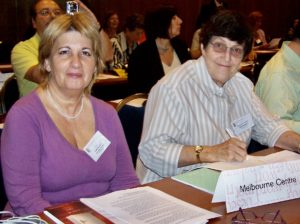
PEN Women Writers Committee Chair Dr. Judith Buckrich and International PEN Board member Judith Rodriguez (Melbourne PEN)
Bishkek PEN did a study highlighting the problem. Central Asian women writers were struggling with poverty, it said, and literature was no longer published unless self-published with limited distribution.
“Women writers are now mostly on their own. They have fallen into a cultural vacuum,” the conference proposal noted. “They are not in contact with colleagues outside their own country and know nothing of the state of culture in the world. In the meantime the global community has begun to pay attention to Central Asia because its difficult geopolitical situation could lead to the rise of violent, ultra-religious and fundamentalist ideologies into the area. And it is partly the lack of modern local literature that makes the region a breeding ground where alien ideologies can take root among young people. Flourishing modern literature could be the means to disseminate democratic ideas and social awareness.”
International PEN raised funds for the conference whose theme was “Women and Censorship.” Women from Kyrgyzstan, Kazakhstan, Turkmenistan and Uzbekistan as well as from Finland, Norway, Switzerland and Australia gathered. The discussion focused on the access to education for women, access to literature and the formation of support groups and publishing cooperatives within and outside the region and ways to overcome censorship and self-censorship. The group addressed external pressures on what women should write and considered ways and means to access funding for women writers.
Attendee Kristin Schnider, President of Swiss German PEN, noted, “Following the discussion on the main topic, women and censorship in Central Asia, I learned just how hard it is for the strong and determined women I met to overcome censorship and self-censorship within their societies…First and foremost a woman is perceived as a mother and wife, tending the family. So much so that women feel they are confronted with the choice between being either creative or getting married. Women are not supposed to enter politics…[and] if women insist on writing they are supposed to stick to detective stories or romantic topics.”
In a discussion “The Situation in Central Asia: Women and Society and Economic Censorship,” moderator and documentary film maker Dalmira Tilepbergenova from Kyrgyzstan, noted: (translated from Russian)
“Patriarchy foundations have always been strong in Asia…My disclosing of gender inequality by the example of cinematograph is not casual. Because firstly cinematograph is a corporative sort of creative work and thus the problem of relations between men and women shows very clear and strikingly there. Second, I as a film director have to constantly deal with the problem of my work. Since Kyrgyzstan became independent, our cinematograph has passed through the period of its clinical death to its reestablishment. New names have already appeared and new films have been shot. But strange relations between our cinematograph and gender policy have existed up to now. Unwillingness of men to see women in the spheres usurped by men occur…instinctively. And this instinct is as strong as the instinct of self-preservation. Firstly, when the woman is engaged on an assisting job position in our cinematograph, everything seems to be all right. But as soon as the woman shows a desire to make films independently, the friendly atmosphere of men around her turns into syndicate of plotters. Men at once start to blame the woman for her excessive ambitions, incompetence, and uselessness. Men also criticize her private life. The woman’s desire to make films is considered as diagnosis of having deficit of sex.”
IPWWC Chair Judy Buckrich of Melbourne PEN reported the Bishkek conference was “a fantastic opportunity,” and said the committee had already begun planning for a meeting of women writers on the African continent to follow the Senegal PEN Congress in 2007. “The meetings are important in expanding the horizons of PEN to women who are not members of PEN but who PEN supports as part of its belief to support writers in difficult circumstances,” she noted.

Women Writers meeting at 2005 PEN Ghana conference including Veronica Uzoigwe (Nigerian PEN), Zeinab Koumanthio Diallo (Guinean Center), Ekbal Baraka (Egyptian PEN), Muthoni Likimani (Kenyan PEN), Kristin Schnider (Swiss German PEN), Caroline McCormick Whitiker (PEN International Executive Director), Jane Spender (PEN International Programs Director), Joanne Leedom-Ackerman (PEN International Secretary/American PEN)
In December 2005 International PEN’s conference in Accra brought together 36 writers, a number of them women, from 13 of PEN’s 17 African Centers to prepare for the 2007 Senegal Congress. Supported by UNESCO and hosted by Ghanaian PEN, the conference aim was to begin developing a plan for sustained programs and collaboration among the African centers and to select a theme for the Congress. While PEN Senegal would act as the host center, the World Congress was a joint effort of PEN’s PAN African Network. African members of the Women’s Committee held an additional meeting to address the challenges facing women writers in Africa and to plan for the larger IPWWC conference in 2007.
In preparing for the Ghana conference, I returned to the shelves of African literature I’d read years before and pulled some of the books which first took me to Africa before I ever arrived on the continent—Ama Ata Aidoo’s No Sweetness Here, Ayi Kwei Armah’s Fragments, Charles Mungoshi’s Waiting for the Rain. In my address to the conference, I included a quote from Ghanaian writer Kofi Anyidoho’s prose poem Akofar only to discover when I arrived that Kofi Anyidoho was on the program.
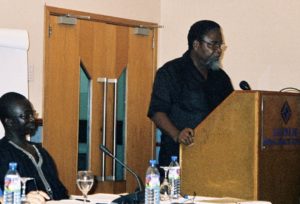
Speaking Ghanaian Professor and poet Kofi Anyidoho, seated Frankie Asare-Donkoh, Secretary PEN Ghana
From Akofar:
Words are birds. They fly so fast too far from the hunter’s aim. Words are winds. Sometimes they breeze gentle upon the smiles our hearts may wear for joy; they fan the sweat away from fever’s brow; they lull our minds to sleep upon the soft breast of earth. Yet soon too soon words become the mad dreams of storms. They howl through caves through joys into shrines of thunderbolts. They leave a ghost on guard at memory’s door. Therefore gently…gent-ly…Akofa, gen-t-ly…Take care what images of life your tongue may carve for show at the carnival of weary souls.”
The poem spoke to the themes and mission of PEN and the gathering of writers who understood that words transport over time and place and history, that words cross borders and have the power to connect us to each other and to ourselves. It is words, shaped into images and ideas, that survive wars and famine and political unrest if we are vigilant and protect them and circulate them and translate them.
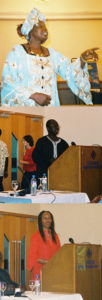
Top to Bottom: Zeinab Koumanthio Diallo (Guinean PEN), Frankie Asare-Donkoh (Ghanaian PEN), Veronica Uzoigwe (Nigerian PEN)
I also quoted from Ghanaian poet Ayi Kwei Armah’s Fragments:
“Where are you going,
go softly.
Nananom,
you who have gone before,
see that this body does not lead him
into snares made for the death of spirits.
You who are going now,
do not let your mind become persuaded
that you walk alone.
There are no humans born alone.
You are a piece of us,
of those gone before
and who will come again.
A piece of us, go
and come a piece of us.
You will not be coming,
when you come,
the way you went away.
You will come stronger,
to make us stronger,
wiser,
to guide us with your wisdom.
Gain much from this going.
Gain the wisdom
to turn your back on the wisdom
of Ananse.
Do not be persuaded you will fill your stomach faster
if you do not have others’ to fill.
There are no humans who walk this earth alone.”
The poem reflected the aspiration of PEN and the meeting among participants who, as writers, often did work alone, yet understood we were all part of a larger community. For any community of letters to thrive and survive, the freedom of the individual writer had to be protected.
At that time in Africa over 230 writers in 34 countries were listed as PEN cases, excluding Egypt, which was counted in the Middle East, though the President of Egyptian PEN also attended the meeting. The large majority of cases were journalists arrested as critics of the authorities or as whistleblowers on corruption. Journalists also ran afoul of the “insult laws” which were on the books in 45 of the 53 African countries. Because of the difficult state of publishing in Africa, journalists were the group of writers with realistic possibilities of being published. Countries of most concern then were the Democratic Republic of Congo, Eritrea, Ethiopia, Gambia, Libya, Somalia, Tunisia and Zimbabwe, none of which had active PEN centers, though a Somali-speaking PEN center did exist in London, and Zimbabwe PEN had existed but was inactive with its President poet Chenjerai Hove having to live in exile. (Today there are PEN centers in Eritrea, Ethiopia, Gambia, and Tunisia though the situation in some of the countries remains problematic.)
The Network of African Freedom of Expression Organizations (NAFEO) had formed just two months before the conference with 33 freedom of expression organizations attending a press freedom conference in Ghana. The aims of the network were similar to PEN’s whose Writers in Prison Committee would interact and assist when the network began to function.
The attendees at the Ghana conference shared experiences of their PEN centers, particularly in providing writing and reading programs in schools. Ghana PEN had a robust program in the schools as did other centers. The delegates agreed that the goals and work of PEN in Africa should include expanding freedom of expression, helping to lower barriers to publishing and disseminating African literature, cultivating new voices and increasing access to literary creation. The means to achieve these goals were part of the discussion, including cultivating new voices by working with youth writing clubs, bolstering recognition and excellence in literature by awarding literary prizes. Delegates planned for these discussions to continue among the African PEN Centers, facilitated when possible by International PEN. They also planned to expand the ideas and work at the 2007 PEN Congress.
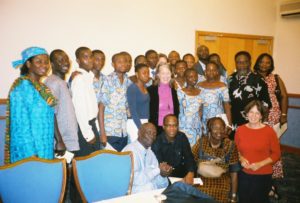
Writers and visiting students at 2005 PEN International Conference in Accra, Ghana. African PEN Centers attending conference: African Writers Abroad, Algeria, Egypt, Ghana, Guinea, Kenya, Malawi, Nigeria, Senegal, Sierra Leone, Somali-Speaking, South Africa, Uganda and Zambia as well as American and Swiss German and International PEN facilitating and note taking.
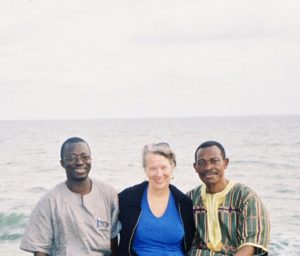
Ghana PEN organizers Frankie Asare-Donkoh, General Secretary and Frank Mackay Anim-Appiah, President with PEN International Secretary Joanne Leedom-Ackerman
During the Ghana conference the possible theme for the 2007 Congress was debated and discussed, including:
—Literature and the Environment/ Literature and Ecology
—Literature and Emancipation (women, political, financial)
—Freedom of Expression and Conflict Prevention
—African Writing in a New Age, In and Out of Africa
—The Role of Literature in the Creation of Peace (with sub-themes “The crisis of reading and readership” and “Literature for children”)
—Writers Role in Peace Building in Africa and World & Literature
—Literature and the Oral Tradition (with the subtheme of the environment)
—The Writer’s /Literature’s Role in Peace-building in Africa and the World
—Literature of Exiles/ Exile Literature
—The Roles of Literature and Publishing
—The Word, the World and Human Values
—Challenge of African Literature Today
—Being a Writer in Africa
—Writer in Age of Globalization (cultural diversity)
—Survival of Literature in New Millennium
—African Writing in New Age: In and out of Africa
—Writers and Prevention of Conflict
—Writers in Their Role in Encouraging and Promoting Literacy in Africa (Responsibility and Role of Writer)
—Literature and Conflict management in Africa and the World
—Freedom of Expression and Global Diversity
—Writers in a World in Crisis (diversity, literacy etc)
The theme finally agreed for the 73rd PEN World Congress in Dakar was: The Word, The World, and Human Values.
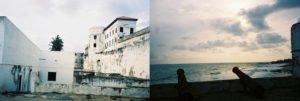
Elmina Castle, built in 1482 as Portuguese trading settlement, became principle holding prison for slave trade on Cape Coast, Ghana for three centuries.
The highlight of the conference was a long road trip to Cape Coast (also known as the Gold Coast), where the first European (Portuguese) explorers arrived in the 1400s. The Portuguese built the Castle of Elmina there which still stands on the rocks above the sea. In this new/old land the Portuguese discovered gold and also began acquiring human beings to trade for European goods. British, Dutch, Danish, Prussian, and Swedish traders soon followed and built other forts along the coast. Elmina Castle was turned into a prison for men and women who were sent shackled through “the door of no return” into slavery. From this point, as well as from Gorée Island off the coast of Dakar, Senegal, the slave trade flourished for centuries as European and other traders sold men and women and goods into the Caribbean and North and South America.
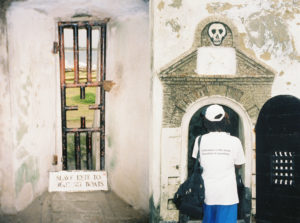
“Slave Exit to Waiting Boats” in Elmina Castle, Cape Coast, Ghana; Kadija George, President of African Writers Abroad Center standing in front of a “door of no return.” The back of her shirt reads: “Literature is the most beautiful of countries.”
The ghostly white fort of Elmina with its iron-barred cells with peep holes to the ocean facing west and the crashing surf on the rocks silenced us as we moved through these portals of history. The several hour ride back to the city was much quieter than our impatient journey to the Coast.
In Tanzania an exchange between poet and audience in the oral and performed poetry often begins:
“I give you a story.”
Audience: “I give you another.”
“I came and I saw.”
Audience: “See so that we may see.”
This power to see and invoke, to enter the rhythm of the human heart and dance there for a time with another as partner is what literature does and what PEN celebrates and tries to protect.
Next Installment: PEN Journey 39: Spiritus Loci—Literature as Home
PEN Journey 7: PEN in Times of War and Women on the Move
PEN International celebrates its Centenary in 2021. I’ve been active in PEN for more than 30 years in various positions and now as an International Vice President Emeritus. With memories stirring and file drawers of documents and correspondence bulging, I am a bit of a walking archive and have been asked by PEN International to write down memories. I hope this personal PEN journey will be of interest.
Iraq invaded Kuwait August 2, 1990. When I picked up my 10-year old son from camp in the U.S. that summer and told him what had happened, his first response was: What about Talal and Alec? These were two of his good friends at the American School in London—one was son of the Kuwaiti Ambassador; the other was from Iraq. He quickly understood the consequences. Fortunately, both of his friends had been out of their countries at the time, though I don’t recall Alec returning to the American School that fall. When the bombs dropped on Baghdad in January, the American School went into lockdown. The older students were issued identity cards. The security force around the school multiplied. When Talal came over to play that winter, he was accompanied by two imposing body guards who stayed outside.
Though the fighting in Iraq concluded by the end of February, security in London continued. By the end of March, the war in the Balkans had begun. Both wars brought to a close the honeymoon many felt after the fall of the Berlin Wall.
For PEN, the outbreak of war in Iraq and in the Balkans led to the cancellation of the planned Delphi Congress and to the convening of conferences in Europe and a two-day gathering of PEN’s Assembly of Delegates and international committees in Paris in April 1991. Delegates from 39 PEN centers came together to conduct the business of PEN at the Société des Gens de Lettres de France which occupied the 18th-century neoclassical Hôtel de Massa on rue de Faubourg-Saint-Jacques in the 14th arrondissement of Paris. There were no literary sessions or social gatherings, or the usual simultaneous translation of proceedings. The business was conducted primarily in English with intermittent French, the two official languages of PEN. (Spanish was added a few years later as PEN’s third official language.)
The Gulf War, the ethnic conflict in the Balkans, the aftermath of the Tiananmen Square trials and the ongoing fatwa against Salman Rushdie predominated discussions in Paris and later in November at the 56th PEN Congress in Vienna. The Gulf War had resulted in increased numbers of writers imprisoned and killed in the Middle East and an increase in censorship. Resolutions condemning the detention and imprisonment of writers in Saudi Arabia, Syria, Israel and Turkey passed the Paris Assembly. Little information was available from Iraq. Another resolution in Paris sponsored by the two American centers expressed concern to the U.S. government and all U.N. member states over the restrictions placed on journalists during the war and urged a review of the ground rules for journalists in conflicts.
Turkey and China continued to hold the largest number of writers in prison, as has been the case for most of my 30-year involvement with PEN. At the time the Turkish government had announced an amnesty for approximately a third of the writers, and there was some hope they might release the additional 80, but new laws were also proposed that could be used against writers. In China where 87 cases were reported, the authorities had announced the end of investigations on the leaders of the June 1989 Democracy Movement. Most sentences were lighter than expected with credit given to human rights organizations like PEN who had kept up pressure.
However, this was not the case for Wang Juntao, a 32-year old academic and Deputy Editor of the Economics Weekly newspaper. In a letter to his lawyer published at the time in The South China Morning Post Wang Juntao explained why he had spoken as he had at the trial even though he knew his penalty would be more severe. “…Only by so doing can the dead rest in peace, since on the soil where they shed blood there are still some compatriots who take risks and speak out from a sense of justice in the most difficult circumstances…” His lawyers had been given just four days to prepare his defense. He was sentenced to 13 years in prison with four years subsequent deprivation of political rights for the crime of conspiracy to subvert the government and for carrying out counter-revolutionary propaganda and incitement. His lawyers pressed him not to appeal so his wife had to do so and was given only three days. The appeal was rejected. [In 1994 Wang Juntao was one of the prisoners the U.S. demanded be released as a condition for trade talks. He was released from prison for medical reasons and now lives in exile in the United States where he has studied and received advanced degrees from Harvard University and a PhD from Columbia University. PEN was among the organizations which lobbied for this release.]
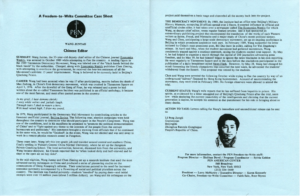
PEN International’s case sheet for Wang Juntao sent by fax and mail in 1990 to centers and members. In 1991 PEN International launched a Rapid Action Network to notify centers and to summarize the cases, actions and advocacy.
During this period PEN through its partnership with UNESCO convened writers in the Middle East and also writers in the Balkans to find common ground and to search out the pylons upon which bridges might be built and to monitor the situation for the writers in the regions. However, because of the Balkan War, it wasn’t possible to hold the meeting with the Yugoslav Centers in Bled as the Slovene Center had proposed. Instead PEN International President György Konrád hosted the gathering in Budapest and followed up with a meeting of South-Eastern European centers in Ohrid, hosted by Macedonian PEN though the Croatian Center wasn’t able to attend. The discussion included the desirability of recognizing the right of conscious objection in time of civil war and the possibility of solving the problem of minorities by allowing multiple citizenship.
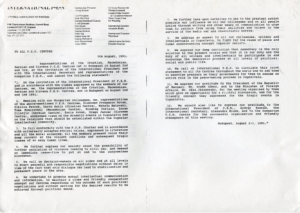
Summary statement of the August, 1991 Conference on the Balkans with all centers from the former Yugoslavia attending except the Bosnian Center, which didn’t come into being until the following year.
In addition to convening dialogues among writers and lobbying on behalf of threatened writers during the Balkan conflicts, PEN also provided financial assistance. Boris Novak, the Slovene Chair of PEN’s Peace Committee and President of Slovene PEN took many precarious trips into war-torn Sarajevo during the almost four-year siege of the city. At one point he reported at least 52 writers and their families were trapped and could only leave if invited to an international peace conference. Slovene PEN planned to host such a conference and invite the writers and their families with the hope the U.N. Peacekeeping Force could provide protection for their exit. He urged other PEN centers to assist in finding residences and perhaps temporary teaching appointments or fellowships for these writers. He also delivered aid to trapped writers, aid gathered from other PEN Centers, donated to the Writers in Prison Committee Aid Fund and to PEN’s Emergency Fund run out of Amsterdam with Dutch PEN.
In an intersection of conflicts, the German and Finnish publishers of Salman Rushdie’s Satanic Verses donated their proceeds from the book to PEN’s Writers in Prison Committee. By the Vienna Congress, Rushdie had lived 1000 days under death threat. PEN continued its defense of Rushdie and its protest against the accompanying violence of the fatwa. The Japanese translator of Satanic Verses had been killed, and the Italian translator badly beaten. (Two years later the Norwegian publisher was shot three times and left for dead.) The bounty had increased on Rushdie, and there was allegedly a hit squad deployed in Western Europe to assassinate him.
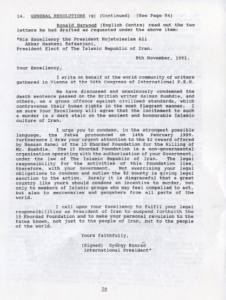
One of many letters sent by International PEN to support Salman Rushdie and to protest the ongoing fatwa.
My personal engagement and memories during this period focused on work with the Writers in Prison Committee and to a lesser extent with the formation of the Women’s Committee, which I supported but which others were driving, and with the establishment of the International PEN Foundation which would be able to receive tax exempt funds for many of these PEN activities. After a discussion of the Foundation’s framework at the Paris Conference, including assurances that the Foundation would not interfere or challenge PEN’s governance, I presented the formal proposal at the Vienna Congress where the Assembly of Delegates approved the establishment of an International PEN Foundation. The Foundation received official charitable status in March 1992 and operated for the next decade until British charitable tax laws changed and a separate foundation was no longer necessary.
Also at the Vienna Congress the Women’s Network, which had formed at the Canadian Congress in 1989, gained approval as a standing committee of International PEN with assurances that men and women were welcome and would work together. Meredith Tax, a chief strategist and one of the founders, explained the committee would involve more women in the work of PEN at all levels and address problems that particularly affected women writers in developing countries and would enable women to know each other’s work, much of which was not translated. “The Women’s Committee will be a force to strengthen, not weaken PEN,” she assured the Assembly.
The eventual governance of the Women’s Committee included PEN members from around the world and its chair rotated to different regions. Each of PEN’s standing committees had its own governing structure. The Women’s Committee was unique in its inclusiveness, which had its own challenges, but which foreshadowed a more inclusive governing structure for PEN International. Twenty-eight PEN centers signed up for the committee with 70 delegates and members, including men, attending the initial meeting.
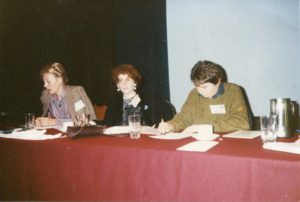
L to R: Moniika van Paemel, (Belgium Dutch-speaking PEN) and Meredith Tax (American PEN) at Women’s Committee Planning meeting at Canadian Congress, 1989
At the time International PEN’s leadership was all male. In its 80-year history International PEN had never had a woman President and only one woman International Secretary and few women as Committee chairs though in many centers of PEN there was a growing balance of men and women members and leaders. In 2015 novelist and poet Jennifer Clement was elected the first woman President of International PEN.
Next Installment: PEN Journey 8: Thresholds of Change…Passing the Torch